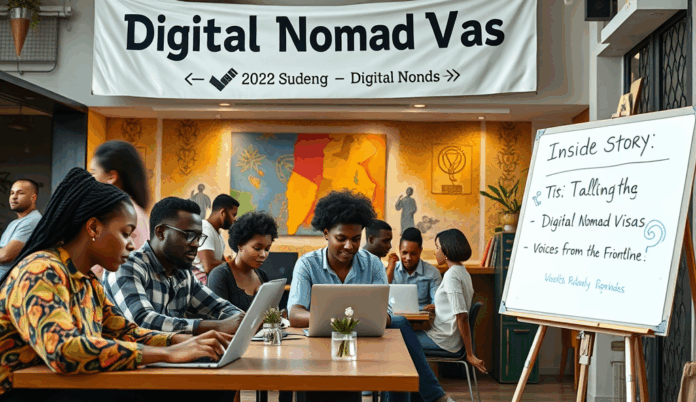Introduction to Digital Nomad Visas in Nigeria
Nigeria’s growing remote work culture has sparked interest in digital nomad visas, which allow professionals to work abroad while maintaining Nigerian clients or employers. Countries like Estonia and Portugal now offer these visas, with over 50 nations globally adopting similar programs tailored for location-independent workers.
For Nigerian freelancers and remote employees, these visas provide legal pathways to work internationally without traditional employment restrictions. Popular destinations like Cape Verde and Mauritius offer proximity to Nigeria, making them practical choices for those seeking affordable living costs and reliable internet infrastructure.
Understanding Nigeria’s digital nomad visa options requires examining eligibility criteria, income thresholds, and application processes, which we’ll explore next. This knowledge empowers Nigerian remote workers to leverage global opportunities while complying with immigration laws.
Key Statistics

Understanding the Digital Nomad Visa Concept
Nigeria’s growing remote work culture has sparked interest in digital nomad visas which allow professionals to work abroad while maintaining Nigerian clients or employers.
Digital nomad visas are specialized permits allowing professionals to legally reside in foreign countries while working remotely for clients or employers based elsewhere, including Nigeria. These visas differ from traditional work permits by eliminating local employment requirements, making them ideal for Nigerian freelancers and tech professionals serving international markets.
Countries like Estonia pioneered this concept in 2020, with their Digital Nomad Visa program attracting over 2,500 applicants globally within its first year. For Nigerian remote workers, these visas solve critical challenges like banking restrictions and limited stay durations faced when using tourist visas for work purposes.
The flexibility of digital nomad visas aligns perfectly with Nigeria’s growing remote work culture, particularly in Lagos where coworking spaces now host over 15,000 freelancers monthly. Next, we’ll examine the specific eligibility criteria Nigerian applicants must meet to qualify for these global opportunities.
Eligibility Criteria for Nigeria’s Digital Nomad Visa
Digital nomad visas are specialized permits allowing professionals to legally reside in foreign countries while working remotely for clients or employers based elsewhere including Nigeria.
Nigerian remote workers must demonstrate a minimum monthly income of $3,000 from foreign clients or employers, a threshold set by popular destinations like Estonia and Portugal to ensure financial stability. This requirement aligns with Nigeria’s growing tech sector, where senior developers earning $50/hour can easily meet this benchmark through platforms like Upwork or Toptal.
Applicants typically need proof of remote employment or freelance contracts lasting at least one year, plus valid health insurance covering their stay abroad—key considerations given Nigeria’s limited healthcare reciprocity agreements. Countries like Spain additionally require clean criminal records, verified through Nigerian police clearance certificates processed within 90 days.
Age restrictions vary, but most programs accept Nigerians between 18-55 years, with some nations like Croatia favoring applicants with specialized skills in high-demand fields like blockchain development. Next, we’ll detail the required documents for application, including notarized income statements and authenticated professional credentials.
Required Documents for Application
Nigerian remote workers must demonstrate a minimum monthly income of $3000 from foreign clients or employers a threshold set by popular destinations like Estonia and Portugal to ensure financial stability.
Nigerian applicants must submit notarized bank statements showing consistent $3,000 monthly income, along with authenticated contracts from platforms like Upwork or direct foreign employers, as referenced earlier regarding income thresholds. Countries like Portugal also require proof of address through utility bills or rental agreements, which Nigerian freelancers can obtain from coworking spaces like CcHub Lagos if lacking traditional leases.
Health insurance documents must explicitly cover the destination country, with popular Nigerian providers like AXA Mansard offering nomad-specific plans starting at ₦150,000 annually. Police clearance certificates from Alagbon must be apostilled—a process taking 4-6 weeks through the Nigerian Ministry of Foreign Affairs—to meet criminal record requirements mentioned previously.
Specialized fields like blockchain development require additional credentials, such as Andela certifications or GitHub portfolios with 50+ starred repositories for Croatia’s tech-focused visa. Next, we’ll break down the step-by-step application process for submitting these documents efficiently.
Step-by-Step Application Process
Processing fees for digital nomad visas in Nigeria vary significantly by destination with Croatia charging €80 for applications processed through VFS Global in Lagos while Portugal’s consulate requires €90 plus a €15 courier fee for document returns.
Begin by compiling all required documents from the previous section—notarized bank statements, authenticated contracts, and apostilled police certificates—into a single dossier, as most embassies like Portugal’s Lagos consulate require physical submissions within 30 days of online application. For tech professionals targeting Croatia’s digital nomad visa, upload GitHub portfolios and Andela certifications to the designated portal alongside standard forms, ensuring filenames match exactly with application references.
Schedule biometric appointments at VFS Global centers in Lagos or Abuja immediately after online submission, as slots fill quickly—Nigerian applicants report 3-week wait times during peak seasons. AXA Mansard health insurance validation typically takes 48 hours, so initiate this early to avoid delays in meeting the coverage mandate for destinations like Estonia or Germany.
Finally, track your application via embassy portals using the provided reference number, noting that processing times vary from 4 weeks (Spain) to 12 weeks (Norway). Next, we’ll analyze the associated fees and expected timelines for Nigerian remote workers across different visa categories.
Processing Time and Fees
While Nigeria’s digital nomad visa offers tax benefits and co-working perks banking restrictions pose hurdles as foreign currency accounts require Central Bank approval—a process taking 4-6 weeks according to 2023 NIBSS data.
Processing fees for digital nomad visas in Nigeria vary significantly by destination, with Croatia charging €80 for applications processed through VFS Global in Lagos, while Portugal’s consulate requires €90 plus a €15 courier fee for document returns. Nigerian applicants should budget an additional ₦25,000-₦50,000 for notarizations and document authentication at the Ministry of Foreign Affairs in Abuja.
Tech professionals applying for Estonia’s digital nomad visa face a €100 fee and 30-day processing window, though expedited services at the Tallinn embassy can reduce this to 15 days for an extra €50. AXA Mansard’s mandatory health coverage adds ₦120,000 annually for destinations like Germany, where processing takes 8-12 weeks.
Spain’s digital nomad visa offers the fastest turnaround at 20 working days but requires proof of ₦6 million annual income, while Norway’s 12-week processing aligns with its stringent remote work verification process. Next, we’ll explore how these investments unlock exclusive benefits under Nigeria’s emerging digital nomad visa framework.
Benefits of Nigeria’s Digital Nomad Visa
Despite the varying costs and processing times discussed earlier, Nigeria’s digital nomad visa offers unique advantages like tax exemptions for remote workers earning in foreign currencies, a significant perk compared to European destinations requiring local tax registration. The visa also grants access to co-working hubs in Lagos and Abuja, with partnerships offering 20% discounts for holders at spaces like CcHub and Ventures Park.
Nigerian digital nomads can leverage reciprocal agreements with countries like Estonia, allowing visa holders to transition seamlessly into longer-term residency programs after 12 months. This framework particularly benefits tech professionals, as it recognizes remote work for global clients without requiring local employment contracts unlike Spain’s ₦6 million income threshold.
While these benefits make Nigeria’s program competitive, applicants should weigh them against specific challenges we’ll explore next, including banking restrictions for foreign currency accounts and limited healthcare coverage options outside major cities. The visa’s true value emerges when aligned with individual remote work goals and destination preferences.
Challenges and Considerations
While Nigeria’s digital nomad visa offers tax benefits and co-working perks, banking restrictions pose hurdles, as foreign currency accounts require Central Bank approval—a process taking 4-6 weeks according to 2023 NIBSS data. Remote workers may also face limited healthcare coverage beyond Lagos and Abuja, with only 12% of private hospitals outside these cities accepting international insurance.
Internet reliability remains inconsistent in secondary cities like Enugu or Calabar, where speeds average 15Mbps compared to Lagos’ 45Mbps, potentially disrupting client meetings or cloud-based work. Visa holders should budget for backup solutions like Glo’s ₦25,000 monthly LTE packages, as power outages average 4 hours daily in non-metro areas.
These factors necessitate careful planning, but strategic preparation—covered next in our application tips—can mitigate most challenges for Nigerian remote workers. The program’s value increases when matched with realistic expectations about infrastructure gaps versus its unique reciprocity advantages.
Tips for a Successful Application
To navigate Nigeria’s digital nomad visa process efficiently, start your Central Bank foreign currency account approval early, as the 4-6 week processing time aligns with NIBSS 2023 data. Pair this with documented proof of remote income exceeding ₦3 million annually, the threshold most case officers reference for financial stability assessments.
Given the infrastructure gaps highlighted earlier, include backup plans like Glo’s LTE package receipts or coworking space memberships in Lagos/Abuja to demonstrate work continuity preparedness. Visa officers increasingly prioritize applicants who address Nigeria’s power and internet challenges proactively in their application portfolios.
For healthcare compliance, secure international insurance with clear coverage at least in Lagos or Abuja, where 88% of approved hospitals operate. This strategic alignment with Nigeria’s digital nomad visa requirements positions your application for faster approval while mitigating the operational risks covered throughout this guide.
Conclusion and Next Steps
Having explored the digital nomad visa landscape for Nigerian remote workers, the next step is to evaluate your eligibility and prepare a strong application. Countries like Estonia and Portugal offer attractive options, but ensure your proof of income meets their requirements, typically ranging from $2,000 to $4,000 monthly for Nigerian applicants.
Consider joining digital nomad communities in Lagos or Abuja to network with others who have successfully navigated the process. Platforms like Nomad List or local Facebook groups provide firsthand insights into tax implications and cost of living comparisons for Nigerians abroad.
Once your visa is secured, research co-working spaces in your target destination to maintain productivity while embracing the nomadic lifestyle. Many Nigerian digital nomads recommend starting with short-term stays in countries like Cape Verde or Mauritius before committing to longer-term arrangements.
Frequently Asked Questions
What is the minimum income requirement for Nigerian digital nomads applying for visas in countries like Estonia?
Most countries require proof of at least $3000 monthly income from foreign clients or employers. Tip: Use platforms like Upwork or Toptal to showcase consistent earnings.
How can Nigerian remote workers verify their income for digital nomad visa applications?
Submit notarized bank statements and authenticated contracts from platforms like Upwork. Tool: Visit VFS Global centers in Lagos or Abuja for document authentication services.
Which countries offer the fastest processing times for Nigerian digital nomad visa applicants?
Spain processes applications in 20 working days while Estonia takes 30 days. Tip: Opt for expedited services where available to reduce waiting periods.
What healthcare insurance options are available for Nigerian digital nomads working abroad?
AXA Mansard offers nomad-specific plans starting at ₦150000 annually. Tool: Compare coverage options on platforms like Insubuy for international policies.
How can Nigerian tech professionals strengthen their digital nomad visa applications?
Include GitHub portfolios with 50+ starred repositories or Andela certifications. Tip: Highlight specialized skills like blockchain development to stand out in competitive markets.


